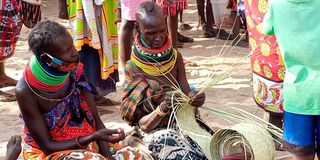Explainer: Unpacking true financial inclusion for women

A Turkana woman weaving a mat at Turkwel village in Loima Sub-county. These women are embracing table banking for financial inclusion.
What you need to know:
- Financial inclusion is closely tied to women's labour market integration and their ability to own and grow businesses through productive credit.
- Lack of it excludes women from full economic participation and limits their capacity for savings, investment and wealth accumulation.
- Enabling true financial inclusion for women is critical for unlocking their economic potential and empowerment.
Financial inclusion is often tossed about in discussions about women’s economic empowerment.
Some say mobile phone-based and chamas are forms of financial inclusion. Others settle on cash transfers.
But what is really financial inclusion and how does it correlate to women?
According to the World Bank, it means that individuals and businesses have access to useful and affordable financial products and services that meet their needs. These can be in the form of transactions, payments, savings, credit and insurance, but delivered in a responsible and sustainable way.
“Access to credit is not enough. It has to be affordable. And so for anyone to promote women’s financial inclusion, they have to consider their needs,” says Dr Laura Barasa, a lecturer at University of Nairobi’s department of economics and development studies.
Women’s financial inclusion is closely linked to their integration into the labour market, UN Women says in its 2022 policy brief on the subject.
In the labour market, they face multiple challenges including being overrepresented in less productive sectors of the economy, face access barriers to decision-making positions, are concentrated in informal jobs and small businesses, and have lower salaries.
For the women who are running their own enterprises, they are hit with the barrier of inaccessibility to productive credit that limits their investment capacity and growth potential.
Owning land
“If their businesses do not grow, women are not only excluded from the market; it is also more difficult for them to meet the eligibility requirements to access credit and other financial services,” UN Women warns in its policy.
Dr Laura says inclusion extends to how women are able to save, invest and grow their wealth.
“It is a question of owning a bank account, saving, investing and investing in houses through mortgage or owning land and making use of it” she says.
As of 2019, 80.3 per cent of women had access to finance compared to 85.6 per cent of men, according to figures from Kenya National Bureau of Statistics.
Additionally, the 2022 data from the Central Bank of Kenya indicate that 33 per cent of women and 45 per cent of men own a house either alone or jointly.





